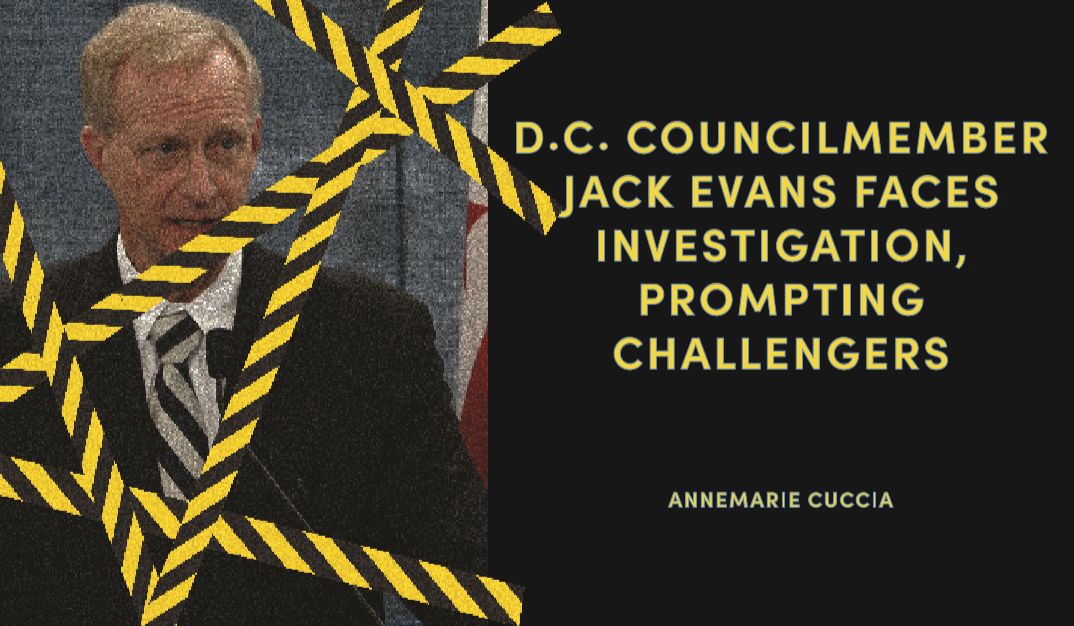For the past twenty-seven years, Georgetown students have been represented on the D.C. City Council by one man, who is now the subject of a federal grand jury investigation—Councilmember Jack Evans. Evans has become a staple of Ward 2—which includes Georgetown and the surrounding neighborhood, as well as Foggy Bottom, Dupont Circle, Federal Triangle, and the National Mall—and is rarely challenged in elections. However, as the June 2020 Democratic primary approaches, Evans faces not only five challengers for his seat, but a series of allegations that threaten his position on the council.
Evans, who declined to be interviewed for this story, has been the subject of two ethics investigations since December 2018. The investigations are centered around the allegation that, beginning in 2015, Evans used his position on the Council to acquire business as a lawyer and consultant. During most of his tenure, Evans worked in the private sector, both for a mutual insurance company and for multiple lobbying firms.
As the longest serving current member of the Council, and only the second person ever to represent Ward 2, Evans’s influence has shaped not only his ward but the entire city. He comfortably won re-election seven times with the votes of wealthy Georgetown residents and has not been challenged since 2008.
Evans has also been a leader in D.C. Democratic politics. He has served as D.C.’s electoral college delegate three times and has been the D.C. Co-Chair on all but one Democratic presidential campaign since 1996.
But the length of Evans’s tenure is now a central part of some of his opponents’ campaigns. Among them is John Fanning, chairman of Advisory Neighborhood Commission (ANC) 2F, who is running against Evans in the Democratic primary.
Fanning said that at the beginning of his tenure, Evans significantly improved the ward. He applauded Evans’s role in bringing the Capital One Arena and Nationals Park to the city, as well as his support of marriage equality, but said Evans’s time is up.
Patrick Kennedy, another candidate in the primary, said Evans has led economic development in the ward, though he doubts Evans’s ability to adapt to an increasingly younger and more diverse ward. “The challenges that he helped address as a council member are challenges of a very different time, and especially when the city was not prosperous, when it was losing population, when it had high crime rates,” Kennedy said. “Jack’s series of policy solutions are very much geared towards a city that is no longer in existence.”
But policy concerns are not the crux of this campaign. Evans’s opponents, prompted by the news of the investigations into his behavior while on the Council, criticize the way they say he has placed his own interests ahead of his ward’s. All five challengers have positioned themselves as a contrast to Evans by promising integrity and respect for the community if elected.
These accusations of corruption are at the heart of the series of investigations Evans faces—that he has routinely chosen to enrich himself or his business interests rather than doing what is best for his constituents.
During most of his tenure on the council, Evans profited from an outside career as a lobbyist. He is one of only two councilmembers (the other is Mary Cheh, a George Washington University professor) with a regular income to supplement the $140,000 salary all members receive, one of the highest for a local representative body in the nation. In 2015, Evans joined the law firm Manatt, Phelps & Phillips, which regularly lobbies the Council. Two weeks after he joined the firm, the Council was the deciding vote on a merger for two of Manatt’s clients, Exelon and Pepco. Evans and six other councilmembers, including former Pepco executive Vincent Orange (then serving at-large), wrote a letter supporting the merger, which was approved by the D.C. Public Service Commission in 2016.
Though Evans stayed with Manatt until last year, in 2016 he also established his own private consulting firm, NSE Consulting. That same year, Digi Outdoor Media, a digital sign company, began installing their products in locations around the city. Digi failed to obtain proper sign permits and was issued a stop-work order by the Department of Consumer and Regulatory Affairs (DCRA), threatening a project valued at $800 million.
Evans had an established relationship with Digi. Emails obtained by District Dig revealed that Digi’s founder, Don MacCord, had given Evans’s son a paid internship in the summer of 2016. Evans also asked MacCord to procure contributions for the Hillary for Victory Fund and invited him to a Clinton campaign event in Nantucket. MacCord and his associates collected over $50,000 for that fund and more contributions for the elections of D.C. councilmembers.
In November 2016, Evans brought emergency legislation to the Council that would allow Digi to continue installing signs across the city despite the DCRA’s stop-work order. A month before this legislation was introduced, NSE Consulting received 200,000 shares of stock, estimated to be worth $100,000, from Digi. Evans told The Washington Post that “the stock certificate was returned to Digi as soon as it was received.”
Despite MacCord’s lobbying for the legislation, Evans pulled the bill when it became clear it would not pass, though Evans still had contact with MacCord and his associates.
Evans also explicitly said that his position, both as a councilmember and as the chairman of Washington Metropolitan Area Transit Authority (WMATA), would be an asset to NSE Consulting clients. In a business development strategy plan sent to the Nelson Mullins lobby group in early 2018, Evans wrote that “In short, that strategy begins by 1) contacting my network of business relationships developed as an elected official, as the Chairman of WMATA, and through my professional and personal affiliations and relationships; 2) partnering with other professional services firms whose clients could benefit from my insight and relationships; and 3) crossmarketing my relationships and influence to Nelson Mullins clients.”
Evans also served as the Principal Director of the Metro Board of Directors, which oversees WMATA. He resigned on June 27 following the release of a memo written by a law firm hired by Metro Board Ethics Committee that detailed Evans’s failure to disclose possible conflicts of interest to the board.
The memo outlines Evans’s relationship with Rusty Lindner, the CEO of Colonial Parking. Evans and Lindner are close friends, and Lindner and Colonial were clients of both Patton Boggs and Manatt while Evans worked there. In 2016, Forge, Colonial’s parent company, hired NSE Consulting to provide them with “information and advice regarding the metropolitan Washington, D.C. business community, including strategic issues relating to jurisdictional competition, transportation, and real estate,” according to the memo.
Evans failed to disclose to WMATA a relationship with Lindner, though he worked intensively on parking issues and attempted to discredit WMATA’s parking vendor and Colonial competitor Laz. He requested a series of investigations into Laz’s proposed projects with WMATA.
The law firm concluded that Evans violated five articles of the Ethics Code to which he was bound, including the duty to avoid conflicts, the duty of loyalty to the interests of WMATA, and the prohibition of using his position for personal or private gain. The firm found similar violations in Evans’s conduct with Digi.
A federal grand jury is conducting a second investigation into Evans’s possible conflicts of interest with clients. Though the investigation has not yet released any findings, it has issued subpoenas. The FBI raided Evans’s Georgetown home in June.
Despite the events of the past months, Evans still sits on the Council. Though Evans attempted to convince the Council no actions should be taken until all investigations into the matter had concluded, they voted to remove him from his position as chairman of the Committee on Finance and Revenue. The Council also agreed to hire a law firm to conduct an investigation into Evans, similar to the one WMATA conducted.
A 6-6 tie prevented Evans from losing his membership on all committee assignments. Evans himself cast the tie vote.
Though Evans has not yet declared his candidacy to keep his seat, it seems he intends to continue to represent Ward 2.
Many of these interactions have been recently brought to light by The Washington Post and local papers, causing an immense backlash both from Evans’s colleagues and constituents.
Kennedy, who has served on the Foggy Bottom ANC since he was a student at George Washington University, was the first to announce his candidacy on April 8. He previously served on Evans’s re-election campaigns in an honorary capacity, but said he had no idea about Evans’s conflicts of interest.
Like the rest of the candidates, Kennedy has chosen to emphasize integrity in his campaign. “The ward needs a councilmember they can trust,” he said.
Jordan Grossman, who works at a Medicaid agency in the District, said that the Ward 2 residents he has spoken to feel Evans is not spending time on the issues that matter to them, especially housing affordability. “In Ward 2 for way too long, people have had to compete for the time and attention of our current councilmember Jack Evans,” Grossman said. “I know that government is a privilege and not a business opportunity.”
Kishan Putta, an ANC commissioner for Georgetown and Burleith, said that he is running because he felt decisions that harmed the community were being made in private and creating cynicism among residents. “All these community voices have been drowned out and it’s been done behind closed doors,” he said.
Daniel Hernandez is the only candidate who has not previously worked for the government in any capacity. “I’m not someone who has spent adult life in the public sphere,” the former Marine and current Microsoft employee pointed out. “Moving on from Councilmember Evans, voters are looking for something different and some real change from politics as usual, and I think I’m that candidate.”
All of the candidates support a ban on outside employment for councilmembers as part of their campaigns. Grossman said he felt the issue was pervasive across the city’s government, as many former councilmembers also become lobbyists. “It’s frankly embarrassing that we have an elected representative who simultaneously serves as a paid lobbyist,” he said.
All five opposition candidates have chosen to participate in D.C.’s new Fair Elections Program, which matches individual contributions made by D.C. residents at a five to one ratio. To qualify for the program, candidates have to agree to only receive small dollar donations and contributions from the committee, preventing them from taking money from super Political Action Committees and lobbyists.
Grossman, who has raised $18,061—the most of any candidate according to end-of-July financial reports—said he liked the knowledge his donations were coming from individual residents.
The program is also designed to allow more candidates to run, as long as they can demonstrate a small base of support. “When you’re running up against big money, and you’re a viable candidate but don’t have access to big money, the Fair Elections Program supports candidates like myself to be able to run a successful and viable campaign,” Fanning said.
With almost ten months before the primary, the candidates are working to distinguish themselves in a crowded field. While Hernandez emphasizes his outsider qualities, Grossman, Fanning, Putta, and Kennedy all assert they have the track record of accomplishments and institutional knowledge needed to succeed.
All the candidates highlighted housing affordability and transportation access as key to their campaigns. Both have potential to impact Georgetown students, especially those who live off campus. Hernandez specifically said he wants to bring a Metro stop to the Georgetown neighborhood.
Fanning said he hoped to improve small business retention, especially in the area surrounding M Street, as well as end homeless encampments in the area.
Putta, who is Indian American, feels he has a lot to offer Georgetown students, especially as the race’s only candidate of color. “Diversity is especially important when rights are being attacked,” he said.
Student involvement is crucial for Kennedy, who said he has spent much of his time on the ANC elevating the voices of college students. Along with the rest of the candidates, he expressed his excitement at potentially being able to represent Georgetown on the Council. Though most Georgetown students are not registered to vote in D.C., the decisions made by the Ward 2 councilmember affect their neighborhood and community.
The campaigns will undoubtedly be influenced by continuing news from the Evans investigations, and his possible entry into the race. Evans must declare candidacy by March 2020 to be in the running to keep his seat, and has said he plans to run for re-election. But with opposition to Evans growing, for the first time in nearly three decades, Evans’s tenure in D.C. politics might be in jeopardy.







Ward 2 Politburo Member-For-Life Jack Evans will not resign, be indicted, or any such thing. He could easily win the primary on a split vote, and is counting on being reelected. Jack wants to go on to be the first elected Governor of the Douglass Commonwealth. The Recall is the only way to stop him. http://ward2citizensrecall.org/